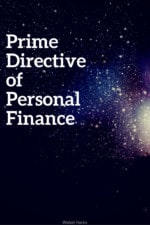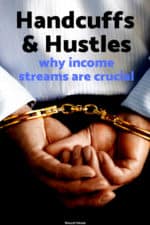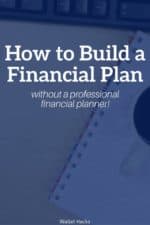
There are posts on this blog that serve as a good resource for people looking to solve a specific problem. Our list of the best savings accounts or our bank promotions page are prime examples. Our reviews of different products, whether it’s a investment platform like Fundrise or a service like Personal Capital, are comprehensive.
Then there are others that are tactical or organizational in nature – like drawing your financial map, building a bank account firewall, and using a secure email address.
They’re useful but they’re not “great.”
I want to list the ten posts on the blog that capture the spirit of what I’m hoping to accomplish and teach. I will keep this updated, replacing and updating posts so this list is always the ten best.
When there’s a new entry, one gets booted from the top ten. You can (and should!) read those too. 🙂
Before you enjoy these, or any other posts on the blog, I’d love it if you read this post on what to do with financial advice on the internet. It gives you a good understanding of how I approach learning from others and it’s how I think you should approach all the writing on this blog.
Table of Contents
- 1. Prime Directive of Personal Finance
- 2. 6.5 Big Money Decisions You Must Get Right
- 3. How to Invest in Yourself
- 4. Handcuffs and Hustles: Why Income Streams are Crucial
- 5. 9 Income Streams of Millionaires
- 6. Maslow’s Hierarchy of Financial Needs
- 7. 7 Lessons Learned Tracking My Net Worth for 14 Years
- 8. How Much is Your Time Worth?
- 9. The Power of HIGH Expectations
- 10. Build Your Own Financial Plan
- Honorable Mentions (Former Top Tens)
1. Prime Directive of Personal Finance
I am a Star Trek nerd and the one rule to rule them all (in personal finance) is what I call the Prime Directive of Personal Finance. I know I’m mixing my sci-fi with my fantasy but bear with me.
80% of all personal finance boils down to the Prime Directive – “Avoid committing future funds to spending obligations; commit them to saving obligations.”
Don’t go into debt. Save and invest as much as you can. And money is a proxy for time.
The goal in life is total control of your time.
👉 Read the Prime Directive of Personal Finance
2. 6.5 Big Money Decisions You Must Get Right
Not all life decisions deserve the same attention. There are decisions that, when made correctly, can overcome dozens of bad decisions.
Mainstream media will have you think that you need to work hard to achieve success but life doesn’t have to be that hard. Experts will have you believe that bringing in lunch and not going out is what you need to do to retire.
The reality is much simpler and easier, but there’s less stuff to sell you if you take this path. If you make the right decisions with your 401(k), you can buy all the Starbucks you want and still retire on schedule.
There are key money decisions that you must focus on if you want to prosper without making unnecessary sacrifices elsewhere.
👉 Read 6.5 Big Money Decisions You Must Get Right
3. How to Invest in Yourself
A lot of personal finance experts are happy to give you suggestions on how to invest your money – use this calculator to set up your asset allocation, invest with cheap index funds, etc.
They skip over the best investment of all – you.
When you’re young, and even when you’re old, your job is your biggest engine of financial growth. You get paid on a regular basis, promotions and skill gathering can lead to salary gains, and it’s where you spent most of your productive time (work).
While you still want to invest in your future self (i.e. retirement), a small investment in your skills now can translate to much bigger gains in income down the road.
The key is in unpacking in what areas you can invest in yourself and your systems. This may even result in a significant change in your life’s trajectory.
👉 Read How to Invest in Yourself
4. Handcuffs and Hustles: Why Income Streams are Crucial
As adults, we all have our roles and responsibilities. Oftentimes, it’s the financial responsibilities that keep us “in” a job that we may not like – we all need food to eat and a bed to sleep in after all.
Sometimes those constraints are made of iron (the stick) or gold (the carrot), but the key to unlocking them is through income streams.
👉 Read Handcuffs and Hustles: Why Income Streams are Crucial
5. 9 Income Streams of Millionaires
Do millionaires really have 7 streams of income? It’s a common adage and one I wanted to dig deeper into.
The reality is that we all have various streams of income that we’ve cultivated over time. For some, it’s simple bank interest. For others, maybe they’ve build a dividend portfolio that pays them on a regular basis.
I take a look at the common saying and dive deeper into thinking how one can build those streams of income. It’s a long post that really focuses on tactics too.
👉 Read: The 7 streams of income of millionares
Once you’ve read it, for further reading you should look at this massive list of passive income sources.
6. Maslow’s Hierarchy of Financial Needs
You’ve probably heard of Maslow’s Hierarchy of Needs (we need food and water before we need prestige). What you may not have considered is how it applies to the way you spend money.
It’s easy to judge how others spend their money but when you put it up against the hierarchy of needs, it can help understand why they spend it that way. There’s a reason why people spend money on luxury goods when regular cheaper versions exist. They’re not stupid. They know that a purse that costs $10,000 doesn’t hold things better than one that costs $100. or $50.
They’re satisfying other needs beyond a bag that holds stuff.
When you understand the hierarchy of needs, a lot of things in life make a lot more sense.
👉 Read Maslow’s Hierarchy of Financial Needs
7. 7 Lessons Learned Tracking My Net Worth for 14 Years
I’ve been tracking my net worth since I graduated college over 14 years ago. Back then, my net worth was zero (actually less than zero, I didn’t include my tens of thousands in student loans!).
In that time, I’ve seen my net worth skyrocket (not hard to do when you start with zero) and I’ve also learned a lot and I share all these wise lessons in the post.
👉 Read 7 Lessons Learned Tracking My Net Worth for 14 Years
8. How Much is Your Time Worth?
The idea that “money is time” is a concept I’ve internalized over the years. When you save money and invest it, you’re not banking just money. You’re banking free time. If you had a million dollars, you’re shouldn’t waste it on stuff. Stuff depreciates very quickly. You’re going to want to spend it on freedom. 🙂
That said, we often fall into the classic trade off dilemma – do we pay money for convenience or do we spend extra time? Do we fly or drive?
Time is valuable but how valuable is it? I created a simple calculator that will give you the value of your time based on your income, some tax assumptions, and a click.
👉 Read How To Value Your Time?
9. The Power of HIGH Expectations
My friend J.D. Roth wrote an article on the power of low expectations. He explains how his overall happiness had improved when he lowered his expectations for himself, others, and his blog. His anxiety lowered. His depression went dormant. I think that’s fantastic. As his blog increased in popularity and became a full business, he felt the weight of this new business being a huge burden despite it rewarding him financially.
We all have expectations for ourselves and no one ever ratchets back those numbers. It doesn’t matter how much money you made last year, it hurts a little if you make less this year. There’s a stress to trying to meet or beat the previous year. Expectations are a double-edged sword in that regard so it’s natural to want to force yourself to lower them a bit to maintain your own mental health.
I don’t disagree, you have to do what you must to push forward, but I want to share an alternative way of looking at the idea of expectations:
👉 Read The Power of HIGH Expectations
10. Build Your Own Financial Plan
You need a plan but you don’t necessarily need a financial planner.
When I was younger, I met a “financial planner” who was little more than a life insurance salesperson. I’ve since met real planners, and many are great, but a lot of what they do you can do yourself if you have a little guidance.
My post on building your own financial plan gets you the 80% that you can do yourself. Most people recommend working with a fee-only financial planner, one that charges an hourly rate, then why not do the 80% you can for “free?” Reserve the last 20%, when you’ll be paying, for the truly hard stuff and to check over your work.
👉 Read Build Your Own DIY Financial Plan
Honorable Mentions (Former Top Tens)
As I publish posts, and as I think those posts beat out some on the existing list, I move them down here. I still think they’re good… but by definition there can be only ten in the list. 🙂
- Building Your Financial Fortress – It’s a visual allegory fitting your financial accounts into the motif of a medieval castle, with moats, walls, and even knights.
- How to Navigate Life’s Milestones – The key to solving life’s problems is to find a mentor who has already solved it.
- How to Reverse Lifestyle Creep – One day you’re subsisting on ramen, rice and beans; the next you’re dropping $50 at happy hour. Lifestyle creep is sneaky.
- 15 Cognitive Biases That Cost You Big Money – We are not rational beings and we have dozens of cognitive biases that hinder and help us each and every day. This post about the 15 hidden cognitive biases that hurt you financially. If you understand them, it may change the way you interact with the world. We discuss everything from anchoring to the halo effect, why it impacts you, and how to combat it.
- How to Build a Family Office – The ultra-rich have these things called family offices. A family office is a company that manages the affairs of a family, from personal to financial. It’s like owning a yacht, you need staff to help you run it. When you have a lot of money, you need staff to help you manage it properly. Not advisors who work with you and other people, we’re talking full-time staff. With technology, you can build a very close approximation of this family office with a few tools.
Happy reading!






